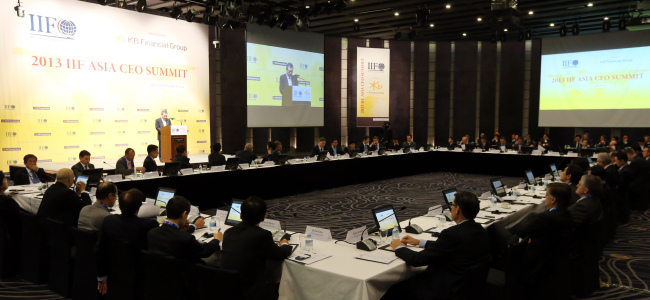KB Financial Group chairman Euh Yoon-dae on Thursday raised the possibility that Asian countries may experience a massive outflow of funds in the wake of some developed countries’ quantitative easing.
His remarks come during the first day of the two-day summit of some 120 Asian financial leaders, dubbed the 2013 Institute of International Finance Asia CEO Summit, at the Westin Chosun Hotel in downtown Seoul.
“Should developed countries unexpectedly adopt an exit strategy (from Asia) upon world economic recovery, Asian emerging markets could be vulnerable to a ‘sudden stop’ in capital flows, where currently large capital inflows would be followed by massive outflows,” Euh noted in his opening address.
 |
The opening ceremony for the annual Institute of International Finance Asia CEO Summit is underway at Westin Chosun Seoul on Thursday. (Yonhap News) |
He said each country’s leaders should push for close coordination, warning against the consequences of adopting hasty exit policies as a buffer for the sluggish economy.
The CEOs who participated in the discussion on challenges of the Asian financial system acknowledged the huge potential in Southeast Asia’s financial market, coupled with relatively high risk that the region.
Concerning the topic, the KB Financial chief told The Korea Herald that “Southeast Asia is a promising region, but we cannot be hasty about it, since it has great a bubble risk.”
While emerging markets sailed relatively unscathed from the financial crisis, the prolonged economic downturn of developed economies and quantitative easing are adding to pressure on inflation and asset prices, he told the participants.
Financial Services Commission chairman Shin Je-yoon also attended the global CEO summit to address finding balance in financial regulation.
“Too often, the need to coordinate financial regulation and supervision is overlooked,” Shin told the CEOs.
He claimed that today’s financial crises are spilling over national borders at a rapid speed, undermining policy effectiveness at the national level.
“We need to set up a framework for coordinating financial regulation and supervision,” he noted, adding that stronger regulatory framework will accelerate the integration among regional capital markets.
He suggested that a joint regional committee of financial regulators was an ideal solution to monitor regulations and market practices and formulate regional regulatory standards.
Meanwhile, the contentious “Abenomics” weighed on the minds of the international CEOs.
“I think it (Abenomics) is the last chance (for Japan),” said Shigesuke Kashiwagi, an executive managing director and chief financial officer of Nomura Holdings Inc.
Participants included IIF CEO Timothy Adams, Mitsubishi UFJ Financial Group CEO Nobuyuki Hirano and International Monetary Fund Asia-Pacific director Anoop Singh.
The panels revolved around worldwide financial controversies, such as the global economic downturn, Japanese quantitative easing policies, Southeast Asian bubble risks and growing unpredictability in the financial market.
Two female leaders ― Asian Development Bank senior adviser A. Noy Siackhachanh and World Bank Group CFO Lakshmi Shyam-Sunder ― were also selected as discussion panel members.
Among participants are leaders from countries including Vietnam, the United States, Thailand, Singapore, Philippines, Mongolia, Malaysia, Japan, Indonesia, Hong Kong SAR of China, Germany, China and Australia.
By Chung Joo-won (
joowonc@heraldcorp.com)








